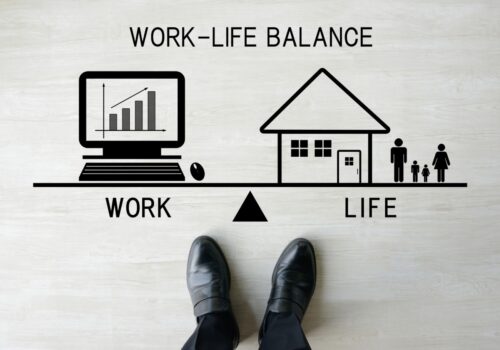In January 2023, Google’s parent company, Alphabet, laid off 12,000 people, setting a record as the company’s largest ever, accounting for 6% of the company’s global personnel. In 2022, 15.4 million people were laid off in the US, while in India, an estimated 100,000 employees lost their jobs over the past two years. While it doesn’t affect an organization, layoff anxiety takes a significant toll on the mental health of employees. Even those who are retained suffer some form of anxiety about a possible layoff. Anxiousness and stress from layoffs can cause depression and reduce focus and motivation; how does one deal with it? If you’re suffering from layoff anxiety, these tips will help.
Layoff Anxiety Can Be a Daunting Experience
Be it unforeseen circumstances, company losses, fluctuations, or restructuring, a job loss or even facing one can cause a cascade of emotions and uncertainties. The most common emotion experienced by all in a similar situation is anxiety, and coping with it is a definite challenge. it’s not impossible; navigating these turbulent times becomes more manageable when you adopt the right mindset and follow these strategies that will help you emerge a stronger person.
Acknowledge Your Emotions
Acknowledging your emotions when experiencing anxiety is essential regardless of the reason. It is natural to be overwhelmed by your situation and the uncertainty of a job. Suppressing your emotions only increases the stress and anxiety. Understand your feelings as a normal response to a negative situation; only then can you go on to manage them more effectively.
It Isn’t a Catastrophe
Catastrophizing a situation where you keep imagining and exaggerating the worst possible outcome, despite it being illogical or unlikely, can fill you with paranoia. At times, in an organizational scenario where the possibility of being laid off looms, it might remain just that—a possibility—rather than a definite reality. This is why it is pointless to imagine a disaster, thinking that you might suddenly find yourself jobless and not able even to another one. Allowing yourself to think this way creates anxiety and depression. What you need to do is accept the possibility of such a scenario occurring. Even if it does happen, it might not be as bad a situation as your mind makes it out to be. Instead, start thinking ahead and create a plan to manage the situation.
Assess Your Financial Situation
One of the biggest fears that most people have when it comes to layoff anxiety is the possible financial ordeal of being without a job. The best way to deal with uncertainty is to assess your finances and plan. Create a budget that outlines your expenses, savings, and any possible sources of income or assistance. Once you have a clear picture in mind about your financial standing, it can help you make informed decisions and ease your anxiety about money. An excellent way to ensure some financial stability is to start a saving plan with more accessible liquidity, which will prepare you for any eventuality when you need finance. If you live in a country where you’re eligible for financial assistance, such as unemployment benefits or severance packages, researching how to acquire them would probably be a good idea.
Develop a Support System
During tough times like layoffs, having a support system in place is invaluable. Reach out to friends, family members, and colleagues who can provide emotional support, advice, and encouragement. Sharing your feelings and experiences with people you trust can help alleviate anxiety and provide a sense of community during a difficult period.
Create a Layoff Plan
Creating a layoff plan for your worst-case scenario is your best go-to response for catastrophizing. A well-structured plan helps you move forward and empowers you to regain some control in your life. Try the following steps.
- Update Your Resume: Begin by updating your resume, highlighting your skills and experiences. This will be a crucial tool in your job search.
- Networking: Reach out to your professional network, former colleagues, and industry contacts for potential job leads, advice, and support. Professional platforms like LinkedIn excel at enhancing your visibility in your field of work.
- Job Search: Dedicate time to researching job opportunities, submitting applications, and attending interviews. Stay organized by keeping a record of your job search activities.
- Skill Development: Use this period to acquire new skills or improve existing ones. Online courses and certifications can be a valuable investment in your future employability. New skills are always a welcome talent, which helps you with more options in case you’re looking for a new job.
- Financial Planning: Continue to monitor your budget, assess your financial situation, and adjust your plan as needed.
Create a Recovery Plan
Being laid off is never your fault. If it happens, be careful not to blame yourself or think the worst about your abilities. There is nothing to be ashamed of because a layoff has everything to do with an organization’s restructuring. To deal with the stress and layoff anxiety, a recovery plan involving self-care is advisable to help you manage the emotional turmoil of the situation.
- Structure your goals: Set weekly or bi-weekly goals in specific areas where you can research jobs and email applications accordingly. While searching for jobs, it’s essential to be realistic, accepting the fact that you may be rejected or offered a lower pay scale. Think of setbacks as temporary obstacles toward long-term objectives.
- Document Your Progress. Maintain a job search document where you can write down your goals and keep a record of your progress. Moreover, through your network contacts, be informed and aware of new trends in the job market. Understanding the current job market conditions in your field will help you make informed decisions and stay ahead of the competition in your job search.
- Self-Care: Maintain a routine of self-care with daily exercise, a healthy diet, and sleep. To help with the layoff anxiety, practice relaxation techniques, and mindfulness to remain calm and composed. Only a relaxed and positive mindset can help you be focused to succeed in acquiring a new job.
Dealing with layoff anxiety is undoubtedly challenging, but with the right mindset and by adopting the strategies outlined here, it can be a smoother journey. Positivity and mental health are your best assets in fighting anxiety, crucial for navigating the uncertainties of a layoff. Moreover, view the experience as an opportunity to test and build your resilience, which may help you become a more determined and mentally strong person.
















